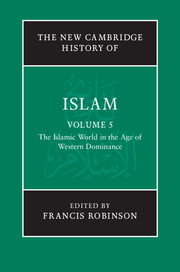Book contents
- Frontmatter
- Introduction
- PART I THE ONSET OF WESTERN DOMINATION C. 1800 TO C. 1919
- 1 The Ottoman lands to the post-First World War settlement
- 2 Egypt to c. 1919
- 3 Sudan, Somalia and the Maghreb to the end of the First World War
- 4 Arabia to the end of the First World War
- 5 Iran to 1919
- 6 Russia, Central Asia and the Caucasus to 1917
- 7 Afghanistan to 1919
- 8 South Asia to 1919
- 9 South-East Asia and China to 1910
- 10 Africa south of the Sahara to the First World War
- PART II INDEPENDENCE AND REVIVAL C. 1919 TO THE PRESENT
- Glossary
- Bibliography
- Index
- References
6 - Russia, Central Asia and the Caucasus to 1917
from PART I - THE ONSET OF WESTERN DOMINATION C. 1800 TO C. 1919
Published online by Cambridge University Press: 28 March 2011
- Frontmatter
- Introduction
- PART I THE ONSET OF WESTERN DOMINATION C. 1800 TO C. 1919
- 1 The Ottoman lands to the post-First World War settlement
- 2 Egypt to c. 1919
- 3 Sudan, Somalia and the Maghreb to the end of the First World War
- 4 Arabia to the end of the First World War
- 5 Iran to 1919
- 6 Russia, Central Asia and the Caucasus to 1917
- 7 Afghanistan to 1919
- 8 South Asia to 1919
- 9 South-East Asia and China to 1910
- 10 Africa south of the Sahara to the First World War
- PART II INDEPENDENCE AND REVIVAL C. 1919 TO THE PRESENT
- Glossary
- Bibliography
- Index
- References
Summary
When the empires of Europe marched off to war in 1914, Nicholas II, Tsar of All the Russias, ruled over more Muslims than any Muslim sovereign. ‘Russian Muslims’ numbered over twenty million at the end of the imperial era, and could claim to be the second-largest confessional community in the empire, yielding only to Orthodox Christians in number. This was a bit deceptive, for this ‘community’ consisted of a vast array of societies with very different historical experiences of Russian rule and different relationships to the Russian state. Although many spoke of a ‘Muslim question’ in late imperial Russia, it is difficult to discern a single ‘Muslim policy’ followed by imperial authorities that would have encompassed all the Muslims of the empire. A survey of Muslim interaction with the Russian state of this breadth and scope therefore has to focus on diversity as its main theme.
Muslims and the Russian state
From the very inception of statehood in what is now Russia, Eastern Slavs have interacted with Muslims, as neighbours, rulers and subjects. Long-distance trade in silver from Muslim lands provided the impetus for the establishment of the first Rus’ principalities, and Islam arrived in the lands of Rus’ before Christianity. The rulers of the Volga Bulghar state converted to Islam at the turn of the tenth century, several decades before Grand Prince Vladimir of Kiev converted his subjects to Christianity in 988.
- Type
- Chapter
- Information
- The New Cambridge History of Islam , pp. 180 - 202Publisher: Cambridge University PressPrint publication year: 2010
References
- 3
- Cited by

